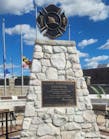PORT ARTHUR, Texas (AP) -- Hurricane Rita victims along the rural Texas Gulf Coast are waiting to see whether their complaints about sluggish federal and state aid result in speedier action in the coming days.
Mayor Oscar Ortiz expressed cautious optimism after meeting with Gov. Rick Perry on Tuesday, but said he was still relying more on private companies and individuals than the government as the city struggles to recover.
''I'm just hoping (the government) comes through,'' Ortiz said. ''It seems like the larger towns in the news are the ones getting the help.''
Nearly four days after Rita hit, many of the storm's sweltering victims were still waiting for electricity, gasoline, water and other relief. The situation prompted one top emergency official to complain that people were ''living like cavemen.''
In the hard-hit refinery towns of Port Arthur and Beaumont, crews struggled to cross debris-clogged streets to deliver generators and water to people stranded by Rita. They predicted it could be a month before power was restored, and said water and sewer systems could not function until more generators arrived.
Red tape was also blamed for the delays.
Nederland City Manager Andre Wimer said ''it's been a terribly frustrating four days'' because of problems getting help from the Federal Emergency Management Agency.
''I can appreciate the difficulty in responding to a disaster that was this widespread, but at the same time we certainly feel we've not received a level of service that was satisfactory,'' he said.
Perry and President George W. Bush surveyed parts of the damaged region Tuesday, asking for patience while federal and state relief makes it way there.
''There's always going to be those discombobulations, but the fact is everyone is doing everything possible to restore power back to this area,'' Perry said.
About 476,000 people remained without electricity in Texas on Tuesday, in addition to around 285,000 in Louisiana. About 15,000 out-of-state utility workers were being brought to the region to help restore power.
Ortiz was blocking residents from returning for three to five days because of a lack of services. The estimated 2,000 people who stayed put during the storm, which made landfall Saturday along the Texas-Louisiana border, face an overnight curfew.
After complaining about a sluggish federal response, Port Arthur received 121 small generators Tuesday afternoon. Ortiz planned to give them to emergency personnel first and then to merchants who provide high-demand products such as gasoline, water and food.
''We have been living like cavemen, sleeping in cars, doing bodily functions outside,'' said John Owens, emergency management coordinator for Port Arthur.
In a Port Arthur neighborhood not far from a grocery store that reeked of rotten food, three FEMA trailers delivered ice, ready-to-eat meals and water.
''Without these trucks here, I don't think we would have made it,'' said Lee Smith, 50. ''I've never left before. I thought it wouldn't be too bad. The good Lord spared us.''
The White House said complete federal funding for debris removal, emergency protective measures and direct federal assistance had been extended through Oct. 27.
Texas Republican Rep. Kevin Brady, whose district includes some of the counties hit by Rita, said he would be developing legislation to provide relief, especially for towns that took in evacuees from Hurricane Katrina.
''While we think much of our help can come through traditional disaster relief programs, we know there will be expenses above and beyond that,'' Brady said. ''We don't want those smaller communities to have sacrificed and not come out whole.''
Associated Press writers Michael Graczyk in Beaumont, Juan A. Lozano in Houston, Paul J. Weber in Dallas and Suzanne Gamboa in Washington contributed to this report.
Copyright 2005 Associated Press





